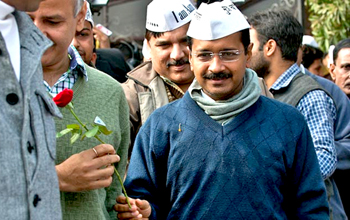New Delhi, May 24: The AAP-led Delhi government today completed 100 days in office, a period marked by its ongoing bitter tussle with the Lt Governor, a split in the party and implementation of a slew of its electoral promises, including slashing power tariff by 50 per cent and providing free water of up to 20,000 litres per month.
 The government also relaunched the '1031' anti-corruption helpline, where people can lodge complaints against officials, to weed out graft and achieve its stated objective of making Delhi the country's first graft-free state.
The government also relaunched the '1031' anti-corruption helpline, where people can lodge complaints against officials, to weed out graft and achieve its stated objective of making Delhi the country's first graft-free state.
The government has planned a mega event at Central Park here in the heart of the national capital tomorrow where the entire Delhi Cabinet will be present to highlight its achievements before the public.
The Arvind Kejriwal government has also initiated the process of regularising unauthorised colonies while it banned demolition of jhuggis immediately after assuming office and held a series of special camps to provide licences to e-rickshaws.
A new body, Delhi Dialogue Commission, was created to implement the government's 70-point development agenda whereas 21 MLAs were appointed as Parliamentary Secretaries to assist in matters of governance.
Its bid to reach out to the rural constituency suffered a serious setback in the form of an alleged suicide of a farmer at a party rally days after it announced relief of Rs 20,000 per acre for rain and hailstorm hit farmers in Delhi.
On the administrative front, Kejriwal had to settle for KK Sharma as the Chief Secretary as the Centre overruled his choice of Ramesh Negi.
A major conflict broke out as the Lt Governor Najeeb Jung appointed Shakuntala Gamlin as the acting Chief Secretary when Sharma went on a 10-day leave.
As Kejriwal questioned the LG's authority and accused him of trying to take over the administration, the Union Home Ministry came out with a notification throwing its weight behind Jung.
The chances of the confrontation ebbing away looks a distant possibility as the two sides have raised the stakes in the power tussle with the Delhi government mulling to take the legal route.
The AAP government has also decided to call a two-day 'emergency' session of Delhi Assembly from Tuesday to deliberate on the notification.
The comment by the Chief Minister, who has repeatedly alleged "conspiracies" against the government, that there should be a "public trial" of the media evoked sharp criticism.
Later, the government also issued a circular on filing of defamation cases against media houses for publishing or broadcasting news that damages the reputation of the Chief Minister, the council of ministers or the government. The circular was stayed by Supreme Court.
In February, the AAP government had announced a 50 per cent subsidy on monthly power consumption of up to 400 units and 20,000 litres of free water per month to all households which would cost the exchequer around Rs 1,670 crore annually.
The free water scheme and power subsidy came into effect from March 1.
The ruling AAP on multiple occasions locked horns with the police, accusing it of creating problems towards smooth functioning of the government, which reached its flashpoint when they got entangled in a tussle over the issue of statutory powers of a District Magistrate who was asked to probe the alleged suicide of farmer Gajendra Singh.
Delhi Police had written to the district magistrate saying he had no jurisdiction in the matter as it was the subject matter of an FIR filed under various sections of IPC, including abetment of suicide.
The period also saw Kejriwal loyalists having an ugly spat with dissident leaders Yogendra Yadav and Prashant Bhushan. The duo were expelled from the party last month.






Comments
Add new comment